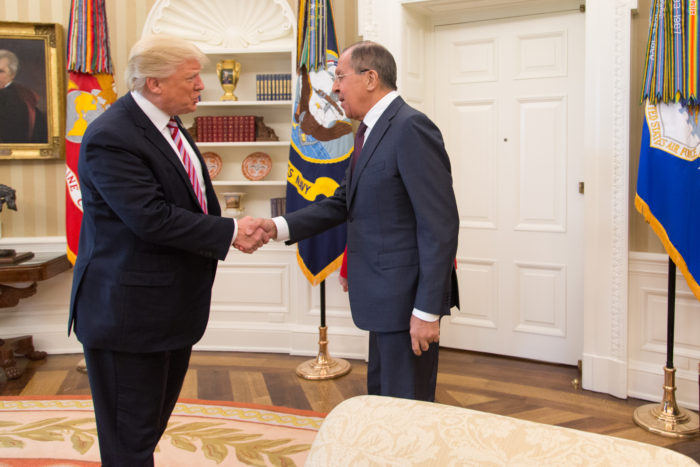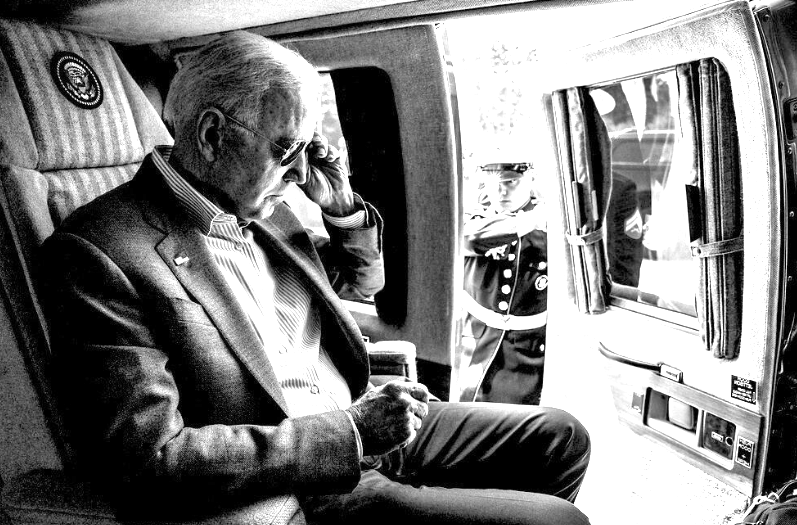SCOTT RITTER: Biden’s 3am Moment in Ukraine
In June, Biden was confronted with the ultimate “3 a.m. phone call” moment. He could have made a call which would have helped reduce the threat of a nuclear crisis or worse.
By Scott Ritter
Special to Consortium News

During the 2008 Democratic primary, Hillary Clinton ran an ad which sought to diminish her rival for the Democratic presidential nomination, Barack Obama, in the eyes of the voters.
Building upon Obama’s lack of experience in national security affairs, and what the potential cost would be should Obama falter at a critical moment, Clinton’s ad sought to make the question personal, setting a scene that could be any home in suburban America at night.
“It’s 3 a.m. and your children are safe and asleep, but there’s a phone in the White House and it’s ringing. Somethings happening in the world.” The listener was then challenged to decide who was best to answer the call, concluding that the best choice would be someone already “tested and ready to lead in a dangerous world.”
It’s 3 a.m., the narrator asks, “Who do you want answering the phone?”
The voters chose Obama over Clinton.
But this did not stop the Clinton camp from reviving the “3 a.m., it’s a dangerous world” theme in an ad that ran eight years later, when Hillary faced off against Donald Trump for the presidency.
“The world is a dangerous place,” a narrator says, as the viewers are treated to an image of the White House at 3 a.m. “At any hour, our president could be called on to act calmly, decisively, intelligently.”
An actor playing Donald Trump sits nearby, engrossed in his twitter feed.
“Will someone get the damn phone?” the Trump character shouts out. “How annoying. Who is calling me at 3 a.m. anyway? Total loser.”
Clinton lost that race too.
Whatever one thinks of Trump, the idea that he was unable or unwilling to make the “3 a.m. call” is contradicted by the facts — especially when it comes to Russia.
In December 2017, Trump provided U.S. intelligence to Russia that helped Russian security forces prevent a terrorist bomb attack on an Orthodox Cathedral in Saint Petersburg. Russian President Vladimir Putin called Trump to personally thank him for the information, which allowed Russia to foil an attack which, according to U.S. officials, “could have killed large numbers of people.”
Trump’s decision to provide intelligence to Russia followed an earlier terrorist attack in Saint Petersburg in April 2017 which killed 11 people and wounded 45 others. Trump spoke with Putin after that attack, expressing his deepest condolences while offering the “full support” of the U.S. .
The December 2017 “3 a.m.” moment showed Trump followed through.
Two years later, in December 2019, Trump again greenlighted the provision of U.S. intelligence to Russia which enabled Russian authorities to stop another planned terrorist attack on Saint Petersburg timed to disrupt New Years celebrations. Putin again called Trump to thank him for the information, which reportedly saved many lives.
All of this seemed to be forgotten when, in September 2020, on the eve of the 2020 U.S. presidential election, 489 former national security officials signed an “Open Letter to the American People”, lambasting Trump as someone who was “not equal to the enormous responsibilities of his office,” declaring that “he cannot rise to meet challenges large or small.”
In contrast, these officials touted Joe Biden, Trump’s Democratic challenger, as “the leader our nation needs”, emphasizing what they described as his “sound judgment, thorough understanding, and fundamental values.”
According to these former national security officials, Biden was better prepared than Donald Trump to meet the “3 a.m. phone call” challenge. Recent events in Russia, however, seem to suggest otherwise.
Did Prigozhin Act Alone?
As the dust settles on last week’s failed armed insurrection carried out by Yevgeny Prigozhin, the owner of the Wagner private military company, one of the key questions that has emerged revolves around the issue of whether Prigozhin was acting on his own volition, or as part of a broader scheme supported by outside agencies, including the intelligence services of nations hostile to Russia.
Russia’s foreign minister, Sergei Lavrov, has noted that Russian security services “are already looking into it.”
The one issue that Russia doesn’t need to investigate is the question of whether the U.S. intelligence community had advance notice of Prigozhn’s abortive coup.
According to U.S. media reports, U.S. intelligence officials briefed Biden, senior Biden administration national security officials, and the so-called “Gang of Eight” (the top congressional leaders in both the House and the Senate involved in national security issues) days in advance of Prigozhin’s precipitous actions.
U.S. intelligence provided U.S. policy makers with an “extremely detailed and accurate picture of Wagner chief Yevgeny Prigozhin’s plans leading up to his short-lived rebellion, including where and how Wagner was planning to advance”, according to CNN.
The expectation of the U.S. intelligence community was that Prigozhin’s march on Moscow would be met with resistance from the Russian government which would result in very “bloody” fighting.
Based upon these assessments, Biden ordered his national security team to develop responses to various scenarios that could play out from the Prigozhin coup. What these scenarios involved remain closely held.
But a tweet by Anton Gerashchenko, an adviser to the Minister of Internal Affairs of Ukraine, provides some insight into the thinking of those who followed the events surrounding Prigozhin’s rebellion.
“Either Prigozhin will be destroyed within 24 hours by a missile strike ordered by Putin,” Gerashenko tweeted, “or he will take over the Kremlin and declare himself as Russian military dictator. What comes next will be civil war and Russia’s disintegration.”
Gerashchenko then expressed concern about “what will happen to the thousands of nuclear warheads, on missiles and planes, if Prigozhin controls them.”
The potential loss of control of Russian nuclear weapons was a scenario broached by anti-Russian twitter accounts, including one that speculated that Prigozhin’s Wagner fighters had advanced in the direction of the village of Borisoglebsk “with the purpose to enter the territory of the military camp ‘Voronezh-45’, where the military unit 14254 (12th Main Directorate of the Russian Defense Ministry (GUMO)) is located.”
This unit is responsible for the security of tactical nuclear weapons.
(According to more knowledgeable sources, the Voronezh-45 facility, which supported a nearby Russian air force base used for training, was likely empty of nuclear weapons.
In any event, given the fact that Russian nuclear weapons are disassembled while in storage, and that the various components and codes needed to make any weapons stored at the facility usable would have been unavailable to the Wagner fighters, mitigates against the idea of Wagner becoming a nuclear power simply by occupying the facility.)
Regardless of the reality surrounding any purported Wagner move on Voronezh-45, senior U.S. officials were concerned about Russia’s nuclear arsenal in relation to Prigozhin’s actions.
‘We Had Nothing to Do With It’
Secretary of State Antony Blinken told the press a day after the Prigozhin mutiny:
“We always prepare for every contingency in terms of what happens in Russia. It’s an internal matter for the Russians to figure out. Of course, when we’re dealing with a major power, and especially a major power that has nuclear weapons, that’s something that’s of concern, something we’re very focused on. We haven’t seen any change in Russia’s nuclear posture. There hasn’t been any change in ours, but it’s something we’re going to watch very, very carefully.”
Biden, a day after Blinken spoke, gave his own public statement, declaring that he had been in constant contact with U.S. allies to coordinate their response regarding the Prigozhin insurrection. Biden’s priority, it seemed, was to make sure no one pointed any fingers at the U.S.
“{W]e had to make sure we gave Putin no excuse,” Biden said, “to blame this on the West, to blame this on NATO. We made clear that we were not involved, that we had nothing to do with it. This was part of a struggle within the Russian system.”
The man Biden tapped to send the signal to Russia and its leader was C.I.A. Director William Burns, who called Sergei Naryshkin, the director of the Russian Foreign Intelligence Service, to make clear that the U.S. was not involved in the Prigozhin affair.
But Burns’ claims ring false. The U.S. intelligence community, by its own admission, had extremely detailed intelligence about what Prigozhin planned to do, including the scope and scale of the involvement of the Wagner mercenaries he commanded, where they intended to go, what they intended to do, and when they intended to do it.
The U.S. intelligence community expected the results of this action to be “bloody.”
According to Blinken, the U.S. was concerned about Russia’s nuclear weapons.
And apparently there was a Russian nuclear weapons storage facility in the line of march of the Wagner fighters heading to Moscow.
Moreover, the Russians had to be wondering why Burns was informing them of this after the fact.
In 2017 and 2019, Trump had U.S. intelligence pass on to Russia information about possible terrorist attacks, which ended up saving scores, if not hundreds, of Russian lives.
In June of 2023, Biden had intelligence about a pending violent insurrection which could have put Russia’s nuclear weapons, and the world, at risk. Biden opted not to share this information with Russia.
America’s silence speaks volumes.
As Dmitry Medvedev, the former Russian President who currently serves as the deputy chairman of the Security Council of Russia (Putin is chairman) noted,
“The development of events shows that the actions of those who organized the military rebellion [of Prigozhin and Wagner] fully fit into the scheme of a staged coup d’état. The world will be brought to the brink of destruction, if the nuclear weapons are in the hands of bandits, the crisis will not be limited to one country.”
In June, Biden was confronted with the ultimate “3 a.m. phone call” moment. He could have made a phone call which could have helped reduce the threat of a nuclear crisis or worse, a nuclear war.
He didn’t make the call.
While Russia and the world dodged a bullet regarding the Prigozhin revolt, the fact that a U.S. president remained mute at a time when his voice should have been seeking to forestall a potential global calamity should be of great concern not only to every American citizen, but every person in the world.
Biden failed his “3 a.m. phone call” test.
Fortunately, the world survived. But what happens next time?
Scott Ritter is a former U.S. Marine Corps intelligence officer who served in the former Soviet Union implementing arms control treaties, in the Persian Gulf during Operation Desert Storm and in Iraq overseeing the disarmament of WMD. His most recent book is Disarmament in the Time of Perestroika, published by Clarity Press.
https://consortiumnews.com/2023/07/02/scott-ritter-bidens-3am-moment-in-ukraine/






Geen opmerkingen:
Een reactie posten